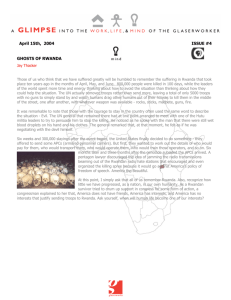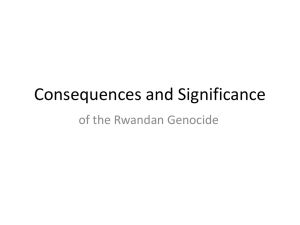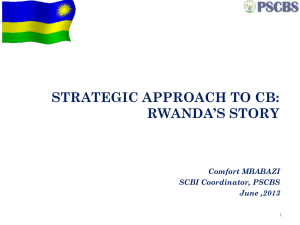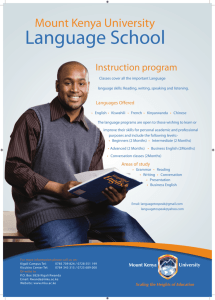MEDIA COUNTRY BRIEF – RWANDA
advertisement
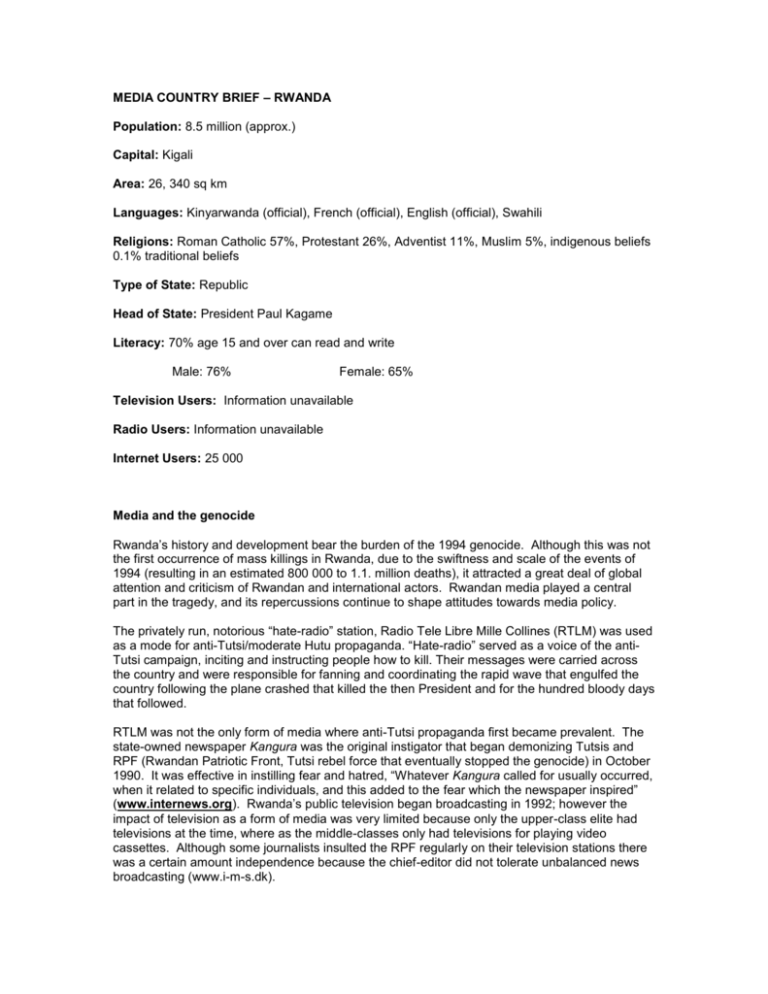
MEDIA COUNTRY BRIEF – RWANDA Population: 8.5 million (approx.) Capital: Kigali Area: 26, 340 sq km Languages: Kinyarwanda (official), French (official), English (official), Swahili Religions: Roman Catholic 57%, Protestant 26%, Adventist 11%, Muslim 5%, indigenous beliefs 0.1% traditional beliefs Type of State: Republic Head of State: President Paul Kagame Literacy: 70% age 15 and over can read and write Male: 76% Female: 65% Television Users: Information unavailable Radio Users: Information unavailable Internet Users: 25 000 Media and the genocide Rwanda’s history and development bear the burden of the 1994 genocide. Although this was not the first occurrence of mass killings in Rwanda, due to the swiftness and scale of the events of 1994 (resulting in an estimated 800 000 to 1.1. million deaths), it attracted a great deal of global attention and criticism of Rwandan and international actors. Rwandan media played a central part in the tragedy, and its repercussions continue to shape attitudes towards media policy. The privately run, notorious “hate-radio” station, Radio Tele Libre Mille Collines (RTLM) was used as a mode for anti-Tutsi/moderate Hutu propaganda. “Hate-radio” served as a voice of the antiTutsi campaign, inciting and instructing people how to kill. Their messages were carried across the country and were responsible for fanning and coordinating the rapid wave that engulfed the country following the plane crashed that killed the then President and for the hundred bloody days that followed. RTLM was not the only form of media where anti-Tutsi propaganda first became prevalent. The state-owned newspaper Kangura was the original instigator that began demonizing Tutsis and RPF (Rwandan Patriotic Front, Tutsi rebel force that eventually stopped the genocide) in October 1990. It was effective in instilling fear and hatred, “Whatever Kangura called for usually occurred, when it related to specific individuals, and this added to the fear which the newspaper inspired” (www.internews.org). Rwanda’s public television began broadcasting in 1992; however the impact of television as a form of media was very limited because only the upper-class elite had televisions at the time, where as the middle-classes only had televisions for playing video cassettes. Although some journalists insulted the RPF regularly on their television stations there was a certain amount independence because the chief-editor did not tolerate unbalanced news broadcasting (www.i-m-s.dk). Ten years later, on December 3, 2003, the International Criminal Tribunal of Rwanda (ICTR) issued verdicts and sentences during the trial of the “hate media”. RTLM’s founder, Ferdinand Nahiman and Hassan Ngeze, a former editor of the newspaper Kangura were sentenced to life in prison after being found guilty. Another RTLM staff, Jean-Bosco Barayagwiza was sentenced to 35 years in prison and a fourth journalist, Georges Ruggiu, a Belgian, had been sentenced to 12 years in prison. This was a very significant milestone as it was the first time since the end of World War II and the Nuremberg trials, that journalists were sentenced to life imprisonment for inciting murder and violence in their news reports and editorials (www.englishpen.org). Official Media Policy One of President Kagame’s first tasks after his election in 2003 was to revive the Information Ministry (Orinfor), which had been disbanded in the aftermath of the genocide. Orinfor’s mandate is to serve the development of all Rwandans. However, according to Reporteurs Sans Frontiers (RSF), only one or two newspapers carry reports criticizing the government and as a result, they are the likely to be targeted by authorities. RSF maintains that although President Kagame’s government boasts about its support for press freedom, it has leveraged on of the wave against “hate media” to justify strict media laws. More action has been called for to guarantee that reporters can work safely. According to RSF (www.rsf.org) and the BBC (www.bbc.co.uk), numerous examples of the detainment of journalists can be cited. Perhaps the most commonly cited is that of “Radio Rwanda” journalist Dominique Makeli who is accused of inciting genocide in his reports; however has never appeared in court (www.afrol.com/articles) and September 2004 marked the tenth anniversary of his imprisonment. In May 1994, while covering what was believed to be an apparition of the Virgin Mary in Kibeho, western Rwanda, Makeli reported that she allegedly said, "The parent is in heaven." The prosecutor insisted that, at the time, this was taken to mean, "President Habyarimana is in heaven." This was interpreted as a message of support for the former President and, by extension, the policy of exterminating Tutsis and moderate Hutus (www.afrol.com). Essentially, both sides have valid reasons to express concern. Makeli’s long detention while awaiting trial is not unique as the judicial system is strained to maximum capacity. Umuseso, the independent Rwandan weekly newspaper has challenged what they believe to be the government’s heavy-handed media policy. They were threatened with temporary closure after refusing to reveal sources. On August 18, 2004 the High Council of the Press (HCP) called on Umuseso’s editor to “acknowledge his mistakes” reveal sources and publish corrections for a series of controversial articles accusing the national assembly vice-president of plotting to seize power. The HCP recommended the Information Ministry suspend Umuseso for four months. Other journalists have been arrested and newspapers seized because of provoking alleged ethnic divisions. Umuseso’s managing editor Ismael Mbonigaba was arrested on a charge of “inciting divisions and discrimination” because his paper reported that former Prime Minister Faustin Twagiramungu would run against President Kagame in the coming presidential election. More recently however, (November 2004) in a Kigali court Umuseso’s Charles Kabonero was to be imprisoned for allegedly “sowing divisions”. This verdict was dropped and he was instead fined for “libel attacking the dignity of a high authority.” The media covering the trial and Reporters Sans Frontiers (RSF) hope that this modified verdict will help open up the way for reform of a more free press (www.afrolnews.com). Current Media Given the impact of “hate-media” on the 1994 genocide, the media today are regulated significantly by the government. The first privately run radio station began broadcasting in 2004. There is a growing number of privately run radio stations and according to the BBC, they face government restrictions and generally undertake self-censorship. However, others maintain that journalists in Rwanda are obliged to follow a “Journalists and Media Code of Ethics” which emphasizes integrity and truth1. Government criticism is permitted provided it is based on sound evidence. Summary of print press and ownership -The New Times - private, pro-government, English-language -Rwanda Herald - private, English-language -Rwanda Newsline - owned by Rwanda Independent Media Group, English-language -Umuseso - sister paper to Rwanda Newsline, Lang: Kinyarwanda language Summary of television companies and ownership -Television Rwandaise (TVR) - state-owned Summary of radio companies and ownership -Radio-Rwanda - state-owned, languages: English, French, Kinyarwanda and Swahili -Radio 10 - private -Flash FM – private -Radio IZUBA -Radio Contact -Radio Maria Summary of news agencies and ownership -Rwanda News Agency (RNA) - pro-government -Orinfor - government information agency Recent Developments The BBC World Service and the Rwanda Bureau of Information (ORINFOR) signed a five-year agreement in August 2003 where by the Rwandan government allocated the BBC a renewed license to broadcast nationwide. The new agreement will result in the BBC opening two new FM relays increasing its coverage in and around Rwanda. The BBC World Service was the first international broadcaster to open FM broadcasting in Kigali since 1998 and has attracted a large weekly audience in Kigali (70% of radio listeners). Voice of America is also widely listened to and broadcasts for one hour a day. In addition Deutsch Welle, RFI have correspondents in Kigali. Since the current democratic government was elected efforts have been made to restructure media practices and professionalism. Prof. Laurent Nkusi, who helped set up the School of 1 Epiphanie Buzizi and Liliane Kanzayire, Stanhope Fellows, March 2005. Journalism and Communication at The National University of Rwanda in Butare is now Minister of Information. He is optimistic about a strong future for the media based on present plans of recovery. Partnerships have been made with the School of Journalism, UNR and the Swedish International Development Agency (SIDA), which have helped to instil a sense of professionalism through training. Several training sessions have already been conducted for local journalists from both public and private media, in line with the ministry’s mission to support professionalism in the media practice. Moreover, plans have been established to start a Journalism Training Institute where journalists from both the private and public media houses would be able to go for refresher courses. According to some reports the government is now prepared to enhance its respect for the International Human Rights Conventions for which in order to revamp the media.The aim is to have a media that is not only informative, entertaining and educative, but also, one that centres on social responsibility and the development process in order to re-establish a nation once broken by a divisive ideology propagated largely through the media (www.newtimes.co.rw). Sources and relevant links www.afrol.com (Indepedent news agency dedicated exclusively to Africa) www.allafrica.com (African news agency) www.ari-rna.co.rw (Rwanda’s News Agency) http://www.cia.gov/cia/publications/factbook/geos/rw.html www.englishpen.org (British Human Rights Organisation) www.global issues.org/Human Rights www.gov.rw (The Government of Rwanda’s official website) www.hrw.org (Human Rights Watch) www.i-m-s.dk (International Media Support – Report) www.internews.org (Internews – Information Access) www.news.bbc.co.uk (BBC World Service) www.newtimes.co.rw (Public Rwandan Newspaper) www.orinfor.com (the Office Rwandais d’Information) www.rsf.org www.rwanda.net (Rwanda Information Exchange)

